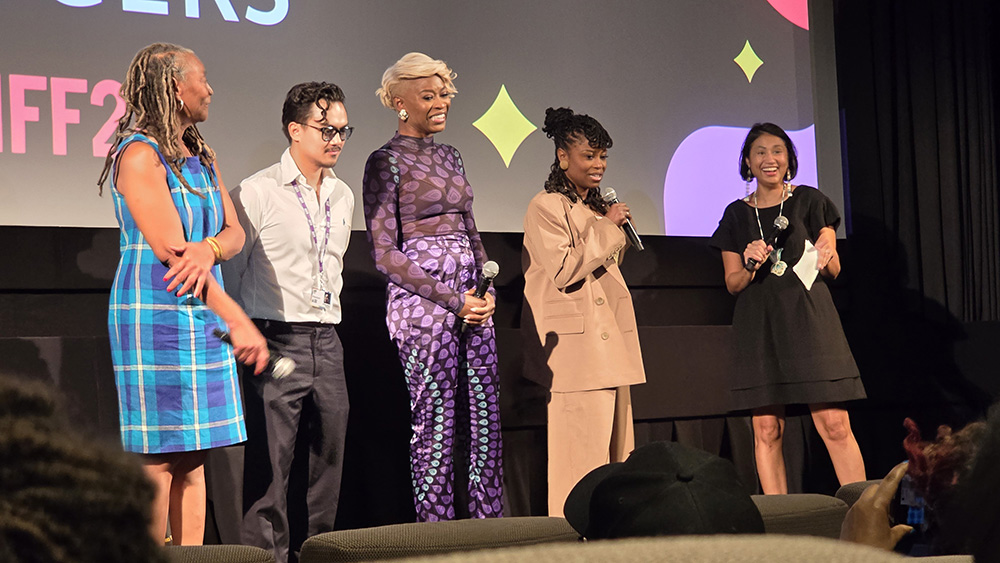In this Village Keeper film review, Kevin Bourne says Karen Chapman’s dramatic feature debut is “a celebration of and journey towards Black healing”.
It’s both the best of times and the worst of times for Black film and television in Canada. Award-winning Black TV shows are being cancelled, but at the same time, there’s a growing crop of independent Black producers and filmmakers sprouting up across the country who are doing great work.
This year’s Toronto International Film Festival featured two filmmakers who should give you optimism about Black filmmaking in Canada. There’s R.T. Thorne with 40 Acres which has generated buzz among Black and non-Black viewers alike. And then there’s Karen Chapman who premiered her debut dramatic feature film Village Keeper starring Olunike Adeliyi, Maxine Simpson, Zahra Bentham, and Micah Mensah-Jatoe.
The film follows Beverly-Jean (Adeliyi), a widowed mother of two who is forced to move her family into her mother’s small Lawrence Heights apartment after the murder of her husband. Though dreaming of a better life for her family, she still needs to heal from the traumas of her past in order to truly move forward.

Now, there’s a lot to appreciate about this film. First, it’s not everyday that you see Toronto playing Toronto on screen. Toronto is often used to double as cities like New York, but this film shows Toronto in all its Toronto-ness, including TTC trains and stations, local neighbourhoods, and the way we talk. We’re so used to seeing Black stories from big cities in the United States, it’s refreshing to see a Black story set in Toronto.
Second, the cinematography from Jordan Oram was on point, especially in the apartment scenes, and aided in the telling of the story and creating a sense of intimacy and vulnerability between the characters.
Next, we have the performances. We’ve grown to expect solid performances from Olunike Adeliyi who also appears in the TIFF world premiere for the Claressa Sheilds biopic The Fire Inside where she plays Shields’ mother. While we’ve seen her appear in more and more films and TV shows in the United States, there’s something special and familiar about seeing her play a Black woman living in Toronto. She does an excellent job portraying the kind of character local viewers can relate to.
Zahra Bentham and Micah Mensah-Jatoe also shine in their portrayals of Beverly-Jean’s teenage children, Tamika and Tristin. While Chapman could’ve opted to play into stereotypes surrounding Black youth, Bentham portrays a young lady who has a good head on her shoulders and is about her business, and Mensah-Jatoe portrays a young man who is intelligent and artistic, but still grappling with the passing of his father and hero. With their performances, Bentham and Mensah-Jatoe prove they are rising talents that we should be hearing more about in the future.
Another standout is Ethan Burnett. Though appearing in a minor role, Burnett oozes charisma in his portrayal of Tamika’s love interest, Javion. Many of us know those young men who may appear rough around the edges when they’re hanging out on the block with their boys, but when you really get to know them, they’re kind, charming, and well-mannered. In his brief time on screen playing the quintessential young man from streets of Toronto, Burnett shows that he’s a talent to watch in his own right.
Also among the cast are retired nurse, Maxine Simpson, who should also be commended for making her acting debut in the role of Beverly-Jean’s mother. Meanwhile, dub poet, artist, and activist, and Toronto legend, d’bi.young anitafrika makes an appearance as Beverly-Jean’s therapist.
This film is a reminder that despite the news headlines about crime and shootings, there are individual successes and breakthroughs happening in our personal lives (that aren’t reported on in the news), that collectively will make our city a better place.
What Chapman does well is bring the story and characters, which should resonate with audiences beyond Toronto, to a proper conclusion, providing audiences with some well-needed inspiration. While some films discuss Black trauma and leave viewers and characters with no resolution in sight, this film does the opposite. Village Keeper isn’t a film about Black trauma; it’s a celebration of and journey towards Black healing; a process we should all go through. It does a good job of highlighting mental health and normalizing therapy, and giving viewers hope that despite the traumas we’ve faced, there’s something better on the other side if we’re willing to do the work.
Kevin Bourne is SHIFTER’s Toronto-based editor and Senior Entertainment Reporter focusing on Black music and film & TV. He was named one of 300 international voters for the 81st and 82nd Golden Globe Awards by the Golden Globe Foundation and a Tomatometer-Approved Critic by Rotten Tomatoes.
Related content:
FILM REVIEW – 40 ACRES IS A BIG STEP FORWARD FOR CANADIAN CINEMA